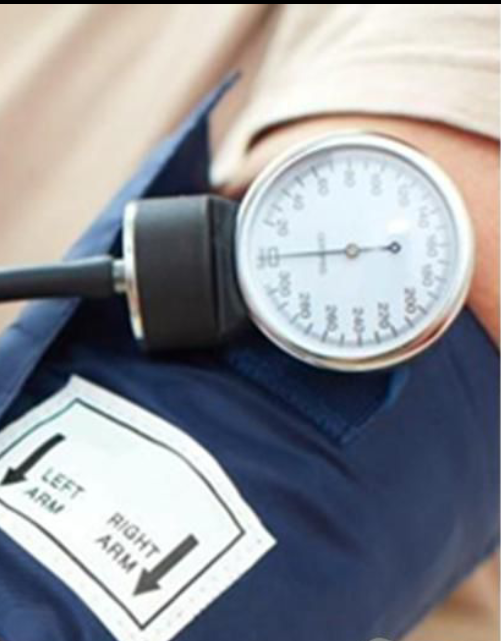
“My Own Son is My Biggest Problem” – Pharmacist Recounts Encounter With Elderly Woman Whose High Blood Pressure Was Triggered by Heartbreak

In a world where old age is supposed to be a time of rest, reflection, and care from the younger generation, an encounter shared by a Nigerian pharmacist has revealed just how heartbreaking the reality can sometimes be. The pharmacist, identified on X (formerly Twitter) as @MrMekzy_, recounted his experience with an elderly woman who came to him visibly disturbed, complaining of restlessness and lack of sleep for several days. What began as a routine health check quickly unfolded into a story of betrayal, heartbreak, and neglect that left many Nigerians shaken.
According to his narration, the woman came to check her blood pressure after days of discomfort. Upon testing, the results were alarming — her blood pressure was dangerously high, the kind of reading that could easily spiral into a stroke or heart attack if not carefully managed. Concerned, he asked her what could have triggered such a spike, hoping to understand the root cause. What she revealed left him stunned.
The woman, who had spent her youth laboring alongside her late husband to build something for their family, said her pain did not come from a lack of food, shelter, or even illness. Instead, it came from her very own son, who had turned her golden years into a nightmare. She explained that her husband, before passing away, had left behind a piece of land — the family’s only tangible inheritance and a form of security for her old age. It was a property that represented sweat, sacrifice, and foresight, a cushion meant to shield her and her children from the harsh realities of life. But her son, without remorse, sold the land and squandered the money on frivolities.
As if that betrayal was not enough, she went on to explain how he continued to torment her by selling off household items to fund his reckless lifestyle. The last straw, she said, was when he stole the television set in her living room and sold it without her consent. For her, it wasn’t just the loss of property that broke her heart — it was the audacity, the disregard, and the lack of basic empathy from a child she had nurtured with her sweat and sacrifices.
“He is doing music,” she reportedly said, a tone of disappointment dripping from her words. It wasn’t that she despised his ambition, but what baffled her was the delusion and irresponsibility that came with it. Instead of working hard, learning the ropes, or being patient enough to build his career legitimately, her son seemed to believe that success in music would fall from the sky, and he was willing to sacrifice his mother’s peace and comfort to chase that dream.
The pharmacist, shaken by the encounter, shared it online with a mixture of frustration and sadness. His words reflected not just the pain of the woman but also the helplessness of health workers who often find themselves listening to stories that go beyond physical symptoms. “So people don’t even pity their parents and it’s so sad,” he wrote, highlighting how family members can sometimes be the very reason for the decline in the health of elderly people.
The post quickly gained traction on social media, with many Nigerians expressing outrage at the behavior of the son while also sympathizing with the woman. Several comments poured in, lamenting how the culture of entitlement and recklessness among some youths has turned into a plague. Others reflected on the irony of life, where parents give everything to raise children, only to be repaid with ingratitude and suffering in their old age.
Medical experts have often emphasized the link between emotional stress and high blood pressure. Hypertension, sometimes called the “silent killer,” does not only come from diet, weight, or genetics. Emotional turmoil, heartbreak, and constant mental stress can drive blood pressure to dangerous levels. For elderly people, especially widows or widowers who may already be emotionally vulnerable, such shocks can be life-threatening. In this woman’s case, it was clear that her body was responding not just to age but to heartbreak inflicted by her own son.
This story has once again sparked conversations about how society treats the elderly, particularly parents who find themselves neglected or maltreated by the very children they raised. In African culture, it is often said that children are the staff of their parents’ old age, the ones who will provide support when the parents can no longer fend for themselves. But increasingly, there are tales of elderly mothers and fathers suffering because of the irresponsibility, neglect, or outright cruelty of their children.
Beyond the sadness of the encounter, many Nigerians also used the story as a call to action, urging young people to show more empathy and responsibility toward their parents. Social media reactions revealed deep frustrations about how some youths, blinded by dreams of quick fame or influenced by peer pressure, have abandoned the values of hard work, gratitude, and care for family.
Some users pointed out the dangers of idolizing quick success in industries like music or entertainment without having the discipline to back it up. While there is nothing wrong with pursuing music, the manner in which the woman’s son was going about it — by looting his mother’s possessions and leaving her in distress — was nothing short of heartbreaking. Others called on religious organizations, community groups, and even the government to do more to provide social support systems for the elderly, many of whom find themselves victims of abuse within their own families.
For the pharmacist, the story was more than just an encounter with a patient. It was a reminder of how much pain can hide behind the faces of people who walk into clinics and pharmacies daily. Their ailments are not always physical, and sometimes, no drug can fully cure the wounds caused by betrayal and neglect. It is society’s responsibility, he seemed to suggest, to do better by its elderly, especially those who have sacrificed their lives to raise children.
As of now, the fate of the woman remains unknown, but one thing is certain: her story has resonated with thousands of Nigerians who read it. It has served as a mirror reflecting the reality of many elderly people whose battles with high blood pressure and other health conditions are worsened not by fate or diet but by the heartbreak inflicted by those they love the most.
Her words, “my son is giving me problems,” ring louder than any medical diagnosis. They speak to a growing crisis of values, a reminder that while doctors and pharmacists can prescribe drugs for hypertension, society must find a way to heal the emotional wounds that lie beneath.


